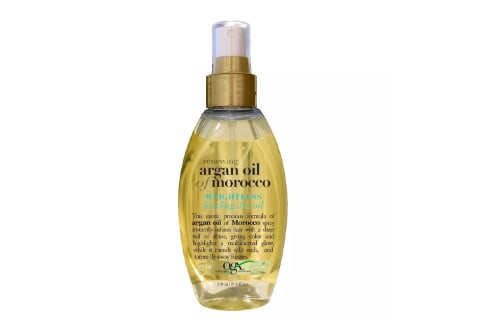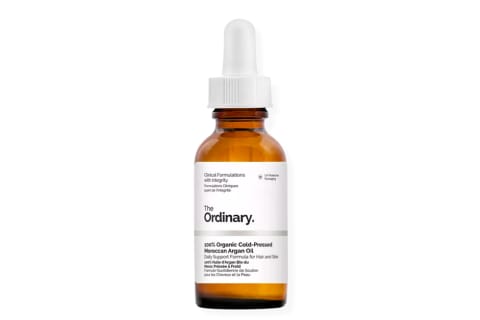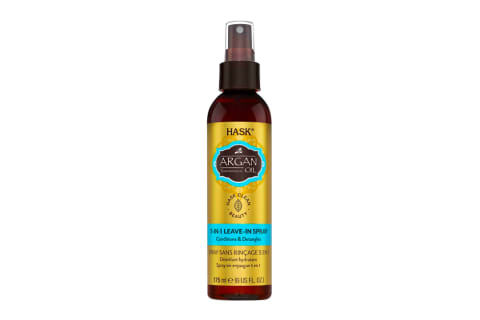Advertisement
The 5 Benefits Of Argan Oil For Hair + How To Use It

Even with the many unique, multi-ingredient hair products on the market today, sometimes getting back to basics is what you need. Apart from shampoo and conditioner, a rich hair oil can serve many purposes.
One of the best multitaskers out there is argan oil. To come, experts explain why this oil is so beneficial for hair health and the best ways to use it.
What is argan oil?
"Argan oil is the pressed oil extracted from argan nuts, native to Morocco," explains clean cosmetic chemist and founder of KKT Consulting Krupa Koestline. This oil has been used for centuries in Morocco for its healing properties both topically and internally.
"Fairtrade, sustainably produced argan oil is from argan fruits picked from the ground, which helps prevent over-harvesting and the threat of deforestation," Koestline adds. Hence, why it's important to know where your argan oil comes from when shopping for it.
This oil is nutrient-rich, containing high amounts of oleic and linoleic acids, which is what makes it so deeply hydrating, Koestline explains.
Benefits of argan oil for hair
Below, a few of the benefits this fantastic oil provides:
Hydrates the hair
Due to the fatty acid content mentioned above, argan oil is a wonderful hydrator for dry or damaged strands. While it won't technically "repair" damaged hair, it can help improve the appearance of breakage, split ends, and dryness.
See, when your hair is damaged or excessively dry or dull, your hair cuticle is open. In order to achieve shiny, healthy locks, you have to seal that cuticle—one way to do so is by using argan oil regularly, says hairstylist and technical education manager for Davines hair care Sunny Brewer.
Helps increase shine
It's nearly impossible to get shiny hair without putting the health of your hair first. As mentioned above, argan oil contributes to shinier hair on a functional level by sealing the cuticle. But it can also provide a shine boost when used in your styling routine, too.
Natural heat protectant
Not only that, but it works as a natural heat protectant, too. "Argan oil, when used as a leave-in product, helps seal the hair cuticles, which adds a layer of protection between the hair and heat to reduce heat damage," Koestline explains.
More specifically, "Argan oil has a higher burning temperature than other oils and can withstand heat as high as 400 degrees and provides some protection from heat," trichologist and founder of alodia Isfahan Chambers-Harris, Ph.D., tells mbg.
This is one reason argan oil is so common in prep and post-styling mists—it's momentarily beneficial, and it contributes to healthier hair in the long run.
Antioxidant properties
Did you know your hair needs protection from environmental stressors, too? Just as you'd apply a vitamin C serum to your skin to fight off free radicals, you should apply antioxidant-rich oils to the hair for the same purpose—and argan oil is one great option.
Koestline notes that argan oil can help to reduce oxidative damage from the hair due to its antioxidant function. This is why you may want to consider using argan oil after washing your hair, in addition to a prewash treatment should that benefit your strands (more on that in a bit).
May help ease dandruff
Chambers-Harris notes that argan oil can even be able to ease dandruff for many. "Argan oil has anti-inflammatory properties, which can help decrease dry scalp," she explains. However, not every person should use loads of oil on their scalp.
If you tend to wash your hair daily, then you probably don't need more oil packed onto your roots. However, folks with dry scalp or dandruff may consider testing out an argan oil scalp treatment before washing their hair—next up, the how-to.
How to use argan oil:
- Pre-shower scalp treatment: If you're prone to dry scalp, apply argan oil before you hop in the shower. Simply part your hair, run the argan oil down the middle, adjust to another part, and repeat until your scalp is lightly covered. Then, massage your scalp for a few minutes before rinsing. Finish up with your normal hair care routine.
- Post-wash: After you get out of the shower, apply argan oil to damp strands to protect from heat, whether you're using a blow dryer, diffuser, straightener, curling iron, etc.
- Hair oiling: Anyone with damaged strands or hair on the drier side can benefit from weekly hair oiling. Simply follow the pre-shower scalp treatment noted above and then carry the oil down throughout your strands. Leave this oil treatment in overnight, or for a few hours before cleansing if that's all the time you have.
- Dry scalp spot treatment: Perhaps you only get dry on your scalp sometimes but don't want to overdo it. If that's the case, use argan oil as a spot treatment for any dry patches that pop up.
- Split end mender: Brewer notes that argan oil is a perfect tool to mask split ends and frizz. If you just styled your hair and notice a few strands going astray, apply a bit of argan oil to your fingertips and gently dab it onto flyaways.
- After styling for shine: No matter how you style your hair, argan oil can provide a hydration and shine boost after you've finished. Think of it like the cherry on top.
Does argan oil work for hair growth?
While some hair oils can stimulate hair growth, like rosemary oil, for example, the data on argan oil doing the same just isn't present quite yet. However, this doesn't mean it can't contribute to overall healthy hair growth.
Given that argan oil can protect your strands from heat, help to seal the cuticle, and hydrate a dry scalp, it is bound to encourage healthier hair. In turn, your hair may have an easier time growing when all of those other factors are functioning properly.
In short: Argan oil doesn't directly stimulate hair growth, but it can contribute to overall healthy hair, resulting in better growth over time.
What to know about hair type
One major benefit of argan oil is that it's for everybody. "All types of hair can benefit from argan oil as it's very versatile and lightweight," Koestline says.
"Even those with thin hair can benefit without it weighing down the hair too much," she adds. As goes with any hair oil, those with oily roots should stick with using it on the mid-lengths to ends of the hair to prevent a greasy look.
Cautions
"Some people are sensitive to oils, so if you were experiencing any irritation or sensitivity, it would be best to stop use," Koestline warns. This is especially true if you're using it on the scalp regularly.
Further, she says that anyone with a nut allergy should do a skin test before using argan oil on the hair.
Best argan oil products
FAQ
What does argan oil do to your hair?
Argan oil is hydrating, helps to seal the hair cuticle, boosts shine, provides antioxidant support, hydrates a dry scalp, and even acts as a natural heat protectant.
Do I put argan oil on wet or dry hair?
You can use argan oil on both wet and dry hair.
Is argan oil good for hair growth?
While some hair oils like rosemary may stimulate hair growth, the data on argan oil doing the same just isn't present quite yet. However, this doesn't mean it can't contribute to overall healthy hair growth.
Given that argan oil can protect your strands from heat, help to seal the cuticle, and hydrate a dry scalp, it is bound to encourage healthier hair. In turn, your hair may have an easier time growing when all of those other factors are functioning properly.
In short: Argan oil doesn't directly stimulate hair growth, but it can contribute to overall healthy hair, resulting in better growth over time.
The takeaway
Argan oil is one of the best single-ingredient products you can use on your strands. It's super hydrating, helps to seal the hair cuticle, boosts shine, and can even heal a dry scalp. Use this oil as a heat protectant, post-styling booster, scalp treatment, or nourishing pre-rinse hair mask. Plus, it even has benefits for the skin—read up on those here, if you're curious.


